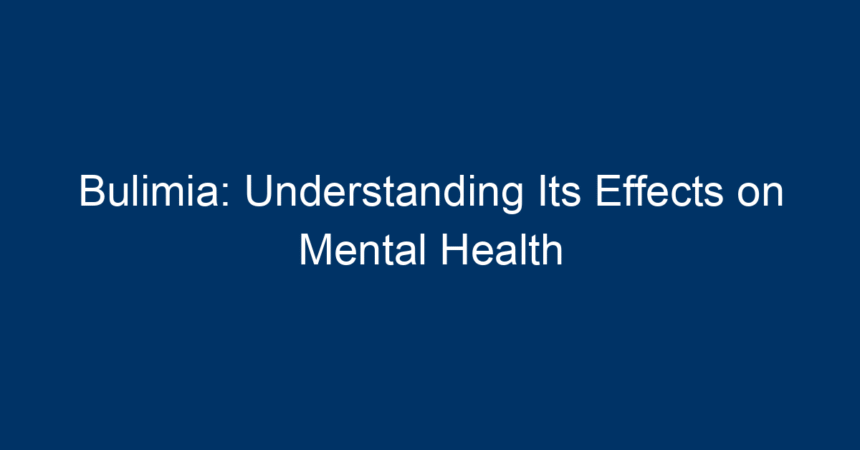Bulimia nervosa, commonly referred to as bulimia, is an eating disorder characterized by a cycle of bingeing and purging. While most discussions focus on the physical repercussions of bulimia, its effects on mental health can be equally devastating. In today’s fast-paced society, where appearance often equates to self-worth, understanding the mental health implications of bulimia is crucial for recovery and awareness.
What is Bulimia?
Bulimia nervosa is not just about food; it encompasses complex psychological issues. Individuals suffering from bulimia often experience an overwhelming fear of gaining weight and a distorted body image. This disorder manifests through alternating episodes of excessive eating followed by compensatory behaviors such as self-induced vomiting, excessive exercise, or diuretics. Notably, it’s essential to recognize that bulimia can affect anyone, regardless of age, gender, or background.
The Cycle of Bulimia
The cycle of bulimia typically follows this pattern:
- Binge Eating: Consuming large quantities of food in a short period, often accompanied by feelings of loss of control.
- Purging: Engaging in behaviors to prevent weight gain, which can include vomiting, fasting, or excessive exercise.
- Guilt and Shame: Following the purging phase, individuals often experience intense feelings of guilt, shame, and self-loathing.
- Repetition: This cycle continues, often creating a harmful loop that can seem impossible to escape.
Understanding this cycle is crucial for addressing the mental health challenges associated with bulimia.
The Mental Health Effects of Bulimia
Although bulimia may begin as a way to manage physical appearance, its mental health consequences can be profound. Here’s a breakdown of some key effects:
1. Anxiety Disorders
Individuals with bulimia are at a heightened risk for developing anxiety disorders. The fear of weight gain, coupled with the shame associated with bingeing and purging, can lead to heightened stress and worry. This anxiety can interfere with daily activities, leading to avoidance behaviors that exacerbate social isolation.
2. Depression
Depression is another common effect of bulimia. Many individuals experience feelings of hopelessness and despair. The cycle of shame and guilt contributes to low self-esteem, which can lead to persistent sadness and a lack of motivation. In some cases, individuals may even contemplate self-harm or suicide.
3. Body Dysmorphic Disorder
A distorted body image is a hallmark of bulimia. This can develop into body dysmorphic disorder (BDD), where individuals become obsessed with perceived flaws in their appearance. Those with BDD may spend excessive amounts of time checking the mirror or engaging in grooming behaviors, trying to achieve an unrealistic ideal.
4. Relationship Strain
The effects of bulimia extend beyond the individual. Relationships with friends and family can become strained as loved ones struggle to understand the condition. Individuals may withdraw from social activities, causing isolation and loneliness, which further impacts mental health.
5. Impaired Cognitive Function
Nutrition plays a crucial role in mental health. The purging behaviors associated with bulimia can lead to nutritional deficiencies, which can affect cognitive function. These deficiencies can manifest as difficulty concentrating, making decisions, and even memory issues.
Seeking Help: Overcoming Bulimia
Recovery from bulimia and its mental health effects is not an easy journey, but it is possible. Here are steps that can help individuals on the path to recovery:
1. Professional Counseling
Seeking professional help from a psychologist or therapist who specializes in eating disorders can be one of the most effective ways to address bulimia. Cognitive-behavioral therapy (CBT) has shown promise in treating bulimia by helping individuals reframe negative thoughts and behaviors associated with eating.
2. Support Groups
Joining a support group can provide a safe space for individuals to share their experiences, learn from others, and build a support network. Connecting with others who understand the challenges of bulimia can help combat feelings of isolation.
3. Nutritional Counseling
Working with a registered dietitian can help individuals develop a healthy relationship with food. Nutritionists can craft balanced meal plans that promote physical and mental well-being, helping to restore an individual’s physical health without the stress of dieting.
4. Mindfulness and Stress Management
Learning mindfulness techniques can help individuals manage anxiety and stress related to bulimia. This can include practices such as meditation, yoga, or deep-breathing exercises, which can help ground individuals in the present moment.
5. Building a Support System
Having a supportive network of friends and family can be invaluable during recovery. Open communication about bulimia and its mental health effects can create understanding and encouragement, making it easier for the individual to seek help.
The Importance of Awareness
Raising awareness about the mental health effects of bulimia is crucial. Often, people misunderstand eating disorders as simply about food or weight, but the reality is far more complex. Education and understanding can reduce stigma, encouraging those suffering to seek help without shame.
Educational Initiatives
Schools, community centers, and online platforms can play a significant role in spreading awareness. Workshops and webinars focused on body positivity, emotional well-being, and the significance of healthy eating can foster understanding and support.
Promoting Body Positivity
Encouraging body positivity in media and educational settings can help challenge societal norms that equate worth with appearance. Celebrating diverse body types, promoting self-acceptance, and redefining beauty standards can empower individuals and reduce the prevalence of eating disorders like bulimia.
Conclusion: A Path to Healing
Bulimia is a multifaceted disorder that significantly impacts mental health. Understanding its effects is essential for recovery. With commitment, professional help, and a supportive community, individuals can break the cycle of bulimia and reclaim their health and happiness.
If you or someone you know is struggling with bulimia, remember that help is available. Reaching out to friends, family, or professionals can be the first step toward healing. Together, we can foster a more supportive environment that encourages recovery and promotes mental well-being.




